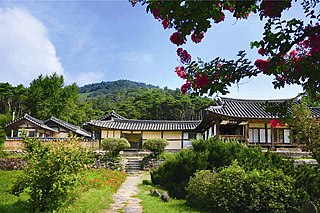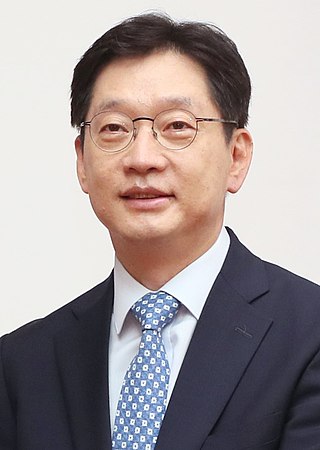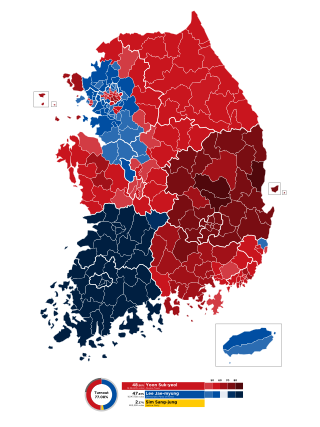| This article is part of a series on |
 |
|---|
The 2018 South Korean by-elections was held in South Korea on 13 June 2018, coinciding with the local elections. 12 seats to the National Assembly of South Korea were contested. [1]
| This article is part of a series on |
 |
|---|
The 2018 South Korean by-elections was held in South Korea on 13 June 2018, coinciding with the local elections. 12 seats to the National Assembly of South Korea were contested. [1]
The following Members of National Assembly lost or resigned from their seats:

South Chungcheong Province, also known as Chungnam, is a province of South Korea in the Hoseo region in the southwest of the Korean Peninsula. South Chungcheong borders the provinces of Gyeonggi to the north, North Chungcheong, Sejong Special Self-governing City, and Daejeon Metropolitan City to the east, and North Jeolla to the south.

Dankook University, abbreviated as DKU, is a private research university in Yongin and Cheonan, South Korea. The university was established in 1947. It was the first university established after the National Liberation Day of Korea, and its original location was in Jongno District and Yongsan District, Seoul.

Kim Kyoung-soo is a South Korean politician who served as a member of the National Assembly of South Korea from 2016 to 2018, and as Governor of South Gyeongsang Province from 2018 to 2021, until he was convicted and arrested for opinion rigging.

Ahn Cheol-soo is a South Korean politician, medical doctor, businessperson, and software entrepreneur. He is a member of the National Assembly as part of the conservative People Power Party. Prior to his career in politics, Ahn founded AhnLab, Inc., an antivirus software company, in 1995. He was chairman of the board and Chief Learning Officer of AhnLab until September 2012, and remains the company's largest stakeholder. Prior to entering politics, Ahn served as dean of the Graduate School of Convergence Science and Technology at Seoul National University until September 2012. Ahn was considered a left-wing politician when he entered politics in 2012, then considered a centrist politician by his 2017 presidential bid, and is now considered a right-wing politician.

Presidential elections were held in South Korea on 19 December 2012. They were the sixth presidential elections since democratization and the establishment of the Sixth Republic, and were held under a first-past-the-post system, in which there was a single round of voting and the candidate receiving the highest number of votes was elected. Under the South Korean constitution, a president is restricted to a single five-year term in office. The term of the then incumbent president Lee Myung-bak ended on 24 February 2013. According to the Korea Times, 30.7 million people voted with turnout at 75.8%. Park Geun-hye of the Saenuri party was elected the first female South Korean president with 51.6% of the vote opposed to 48.0% for her opponent Moon Jae-in. Park's share of the vote was the highest won by any candidate since the beginning of free and fair direct elections in 1987 and the first such election in which any candidate won a majority. Moreover, as of the 2022 election, this is the latest South Korean presidential election in which the winning candidate won an absolute majority of the vote.

Early presidential elections were held in South Korea on 9 May 2017 following the impeachment and removal of Park Geun-hye. The elections were conducted in a single round, on a first-past-the-post basis, and had originally been scheduled for 20 December 2017. However, they were brought forward after the decision of the Constitutional Court on 10 March 2017 to uphold the National Assembly's impeachment of Park. Following procedures set out in the Constitution of South Korea, Prime Minister Hwang Kyo-ahn succeeded Park as the acting president. After Park was removed from office by the Constitutional Court's ruling, acting president Hwang announced he would not run for a term in his own right.

Legislative elections were held in South Korea on 13 April 2016. All 300 members of the National Assembly were elected, 253 from first-past-the-post constituencies and 47 from proportional party lists. The election was an upset victory for the liberal Democratic Party, which defied opinion polling by winning a plurality of seats in the election and defeating the ruling conservative Saenuri Party by one seat. In votes for party lists, however, Democratic Party came third, behind the Saenuri Party in first place and the new People Party in second.

The Justice Party is a centre-left to left-wing political party in South Korea. It has been described as liberal and progressive. It was founded on 21 October 2012 when the former New Progressive Party faction, former People's Participation Party faction, and moderates in the Unified Progressive Party split from the Unified Progressive Party. The Justice Party now takes a more moderate stance than the United Progressive Party or the Democratic Labor Party in the past. The Justice Party temporarily changed its name to, "Green-Justice Party" (Korean: 녹색정의당) on 30 January 2024 in an electoral pact with the Green Party Korea for the 2024 South Korean legislative election. On 27 April 2024, the party reverted back to its original name.

Ahn Hee-jung, also known as An Hee-jung, is a former South Korean politician and convicted felon. He served as the 36th and 37th Governor of South Chungcheong Province. He stepped down from his role as governor and announced his retirement from public life after acknowledging accusations that he sexually assaulted his aide Kim Ji-eun on multiple occasions. In February 2019, he was sentenced to a three-and-a-half-year prison term for sexual assault.
The 7.30 by-elections were held in South Korea on 30 July 2014. 15 seats to the National Assembly of South Korea were contested while re-election occurred for 1 seat to the Municipal Council of Suwon.
The People Party was a centrist political party in South Korea established on 2 February 2016 by Ahn Cheol-soo. The party had a strong support base in the Honam region. The party dissolved on 13 February 2018. A later party of the same name was also founded by Ahn and was active from 2020 to 2022.

The 2019 South Korean by-elections was held in South Korea on 3 April 2019. 2 seats to the National Assembly of South Korea were contested.

The People Power Party, formerly known as the United Future Party, is a conservative and right-wing political party in South Korea. It controls the South Korean presidency and is the second largest party in the National Assembly. The PPP, along with its historic rival, the Democratic Party, make up the two largest political parties in South Korea.

Park Wan-su is a South Korean politician serving as the Member of the National Assembly for Changwon Uichang since 2016. He was also the Secretary-General of the United Future Party (UFP) in 2020.

The People Party was a political party in South Korea. The party was founded by Ahn Cheol-soo in February 2020, after leaving the Bareunmirae Party. It has the same name as the People Party, which was also founded by Ahn and existed from 2016 to 2018.

Presidential elections were held in South Korea on 9 March 2022. Under the South Korean constitution, presidents are restricted to a single five-year term, meaning that incumbent president Moon Jae-in was ineligible to run for a second term. Opposition candidate Yoon Suk Yeol of the People Power Party won the election, defeating candidate Lee Jae-myung of the incumbent Democratic Party.

Jeon Hae-cheol is a South Korean lawyer and politician who served as the Minister of the Interior and Safety from 2020 to 2022. He formerly served as the Senior Secretary to the President for Civil Affairs from 2006 to 2007, under the then President Roh Moo-hyun.

The 2021 South Korean by-elections were held in South Korea on 7 April 2021. The National Election Commission announced on 2 March 2021, that the by-elections would be held for 21 public offices or electoral districts, including 2 Metropolitan mayors, 2 Municipal mayors, 8 Metropolitan Council constituencies, and 9 Municipal Council constituencies. Candidate registration ran from 18 to 19 March, and the list of candidates was confirmed on 26 March.

The June 2022 South Korean by-elections for seven constituencies of the National Assembly were held in South Korea simultaneously with local elections on June 1, 2022.